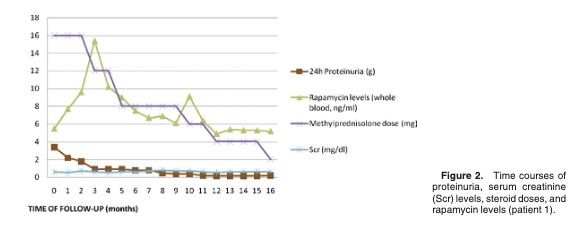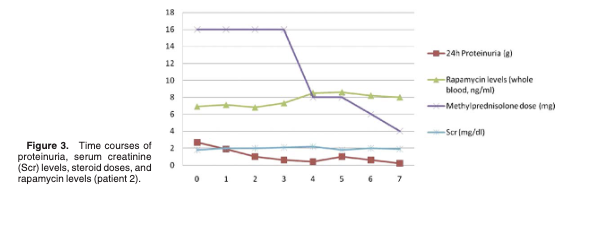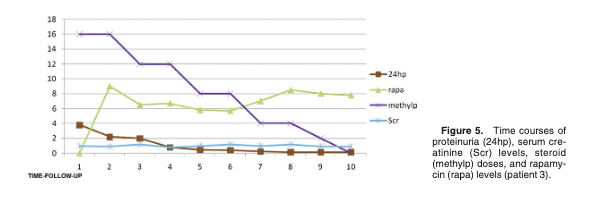Yes, but the study mentions proteinuria as a key factor. Elderly people often have proteinuria, which can be a side effect of diabetes as I understand.
We conducted a study to examine the efficacy and safety of rapamycin in patients with progressive chronic renal failure.
Virtually all people with CRF have proteinuria.
Not all people with proteinuria have CRF.
3 Likes
I have been taking moderately high doses of Rapamycin (10-14 mg eq.) on a weekly schedule for roughly 2 years and my creatinine and eGFR numbers are close to perfection. I have noticed only minor changes in my kidney function numbers which amount to statistical noise IMHO. N=1
4 Likes
This makes sense. Do we have good data on rapamycin’s effects on people with proteinuria but without chronic renal failure?
1 Like
not that I know of, but check Rapamune PI
TABLE 1: ADVERSE REACTIONS OCCURRING AT A FREQUENCY OF ≥20% IN AT LEAST ONE OF THE RAPAMUNE TREATMENT GROUPS IN A STUDY OF PROPHYLAXIS OF ORGAN REJECTION FOLLOWING RENAL TRANSPLANTATION (%) AT ≥ 12 MONTHS POST-TRANSPLANTATION (STUDY 2)*|Adverse Reaction|–––Rapamune Oral Solution–––||
|2 mg/day
(n = 218)|5 mg/day
(n = 208)|Placebo
(n = 124)|
|*
Patients received cyclosporine and corticosteroids.|
|Peripheral edema|54|58|48|
|Hypertriglyceridemia|45|57|23|
|Hypertension|45|49|48|
|Hypercholesterolemia|43|46|23|
|Creatinine increased|39|40|38|
|Constipation|36|38|31|
|Abdominal pain|29|36|30|
|Diarrhea|25|35|27|
|Headache|34|34|31|
|Fever|23|34|35|
|Urinary tract infection|26|33|26|
|Anemia|23|33|21|
|Nausea|25|31|29|
|Arthralgia|25|31|18|
|Thrombocytopenia|14|30|9|
|Pain|33|29|25|
|Acne|22|22|19|
|Rash|10|20|6|
|Edema|20|18|15|
1 Like
Interestingly, this study found significant benefit with a lower dosage twice a day:
“Therapy consisted of 16 mg/d of methylprednisolone and 1
mg twice daily of rapamycin.”
“Rapamycin blood levels were kept between 5 and 15 ng/mL.”



3 Likes
adssx
#11
As I wrote here:
The 2024 international guidelines on CKD say:
Pregnancy may pose a risk of CKD progression for people with established CKD. In addition, some recommended medications to slow or prevent CKD progression are teratogenic (such as ACEi/ARBs or mammalian target of rapamycin inhibitors) and discontinuation during pregnancy should be considered.
I wonder if this is a typo because rapa isn’t mentioned anywhere else in the report and I don’t think mTOR inhibitors are “recommended medications to slow or prevent CKD progression”.
3 Likes
Can we get a summary of the key points???
Please? 
The entirety of the discussion of rapamycin and kidney disease starts here, goes for about two minutes.
Nothing of value in here about kidney disease, whole vid is about rapamycin.
1 Like
Dear all,
Have any of you experienced a significant increase of albumine (protein) in the blood that you expect to be the effect of Rapamycin use?
My doctor told me today to stop using Rapamycin as she said that the increase might be due to the use of Rapamycin.
I’m going to stop taking it for a while so that we can measure if the is a change after 4 weeks.
I’m wondering if there is “permanent damage” to the kidneys or if the effect is reversible.
Comments would be highly appreciated.
Thank you very much in advance!
LaraPo
#18
Asked AI:
Rapamycin, an mTOR inhibitor, does not have a direct, consistent effect on albumin levels in the blood. However, its impact can vary depending on the context:
-
In Kidney Transplant Patients: Rapamycin has been associated with lower serum albumin levels in some studies, possibly due to its effects on protein metabolism or inflammation.
-
In Cancer Therapy: When used as part of nanoparticle albumin-bound formulations (e.g., nab-rapamycin), it does not appear to significantly alter albumin levels
-
General Use: Rapamycin’s effects on albumin are not well-documented in healthy individuals, and any changes are likely to be secondary to its broader effects on metabolism and immune function.
1 Like
This sounds like typical AI waffle word games to me.
Circulating albumin is a very crude measurement in general. It’s affected by liver output, kidney filtration, tissue fluid and edema, and it’s a general marker of inflammation.
The best data I am aware of, the PEARL trial, showed no changes in albumin in those healthy subjects.
2 Likes
LaraPo
#20
I can talk only about personal experience with taking Rapa for 15 years after kidney transplant. AI gave pretty accurate info about decreased albumin in transplant patients associated with Rapa. Mine is always on a lower side and I have to try hard to keep it within norm.
2 Likes
AIUI it is lower when fasting
Thank you Lara. I also tried ChatGPT, but couldn’t find much detail. Thank you for your feedback!
Kind regards
1 Like
Thank you Relaxedmeatball. Most helpful. I’ll study the Pearl trial.
Kind regards
Thank you John. Was thinking about including way more vegetables, beans, etcetera and see what the results are after 4 weeks.
LaraPo
#25
@Longevity_Surge I was thinking about my lower albumin, which I connect with taking rapamycin, but it also could be because I eat less protein being on a kidney diet or because I’m a vegetarian, or both. So it’s not that simple, and it could be that I blame Rapa by mistake.
Hi Lara,
That could very well be. I think that a vegetarian diet would be a good strategy for me as well.
Thank you!
1 Like